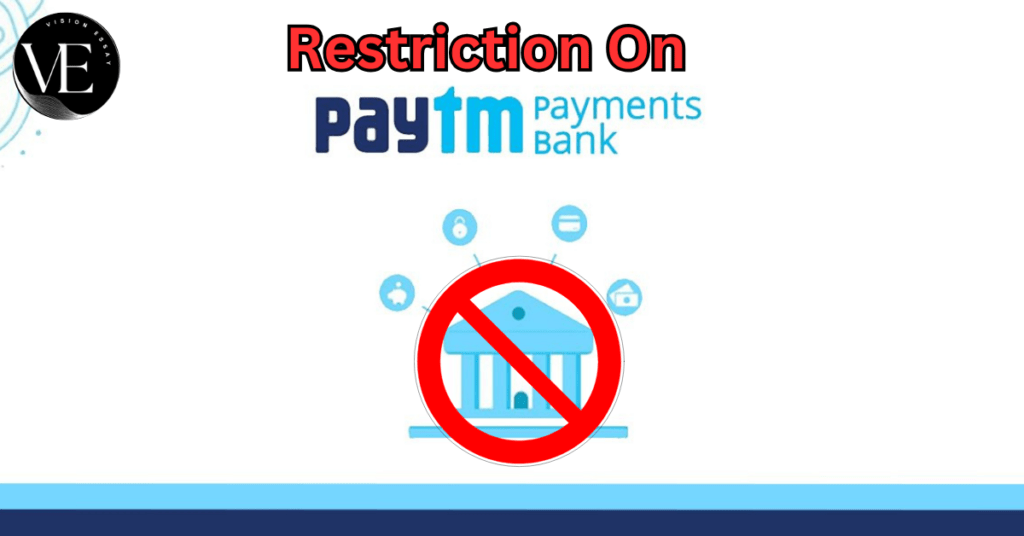Restrictions on the PayTM Payment Bank 2024
Introduction
All transactions have been suspended at Paytm Payment Bank due to limitations enforced by the Reserve Bank of India (RBI). The fintech scene in India has been rocked by this event. Let’s examine the elements that led to the RBI’s decision and the possible effects it may have on the sector.
What are Reasons for Restricting PayTM Payment Bank?
- Due to persistent non-compliance issues, the Paytm Payment Bank has been under investigation since 2018. This has raised concerns about data security, client protection, and compliance with regulatory standards.
- Regulators were closely monitoring the situation after reports surfaced of shortcomings in Know Your Customer (KYC) protocols and possible breaches of data protection laws.
- One further thing that has been brought up as a contributing reason to the situation is the influence of Ant Group, a Chinese financial company that owns a significant portion of Paytm.
- The RBI stepped in, placing penalties for non-compliance and giving clients until February 29, 2024, to take their money out or stop making more recharges.
What is the Background of PayTM?
- After being first released as paytm2 and then renamed paytmbank.com in 2017, Paytm has grown to be a significant participant in the Indian digital payment market.
- Serving a huge user base across the nation, the platform provides several services, such as quick tagging and digital wallets.
- Paytm has proven to be a trustworthy digital payment platform with over 100 million verified users.
What is Impact of PayTM Payment Bank Restriction on Users?
- The RBI’s move raises questions regarding the significant user base’s financial activities.
- Users are much more concerned because of the uncertainty surrounding the return of services.
- President and Chief Operating Officer of Paytm, Bhavesh Gupta, stated that the business is in discussions with other banks and intends to transfer current UPI-accepting merchants to any other bank.
- Paytm’s app and services are still available; they work with other banks to offer services instead of only their associate bank, paytmbank.com.
What is Impact of PayTM Payment Bank Restriction on Industry?
- A cautionary note is being issued to other fintech companies after the RBI’s move against Paytm Payment Bank.
- It underscores the need to have a strong infrastructure for compliance and following rules.
- Many believe it’s an essential measure to guarantee consumer safety and financial stability, while others fear it may impede innovation and stunt the expansion of fintech companies.
- Although it is too early to tell how this will affect the sector in the long run, it surely fosters a more circumspect atmosphere with more stringent regulatory monitoring.
Also read: Indian Banking Sector: Opportunities and Challenges
Conclusion
Both the digital payment platform and its sizable user base are significantly impacted by the RBI’s decision to halt transactions on Paytm Payments Bank. The RBI’s prompt and decisive response serves as an excellent model for responsible governance in digital payments while simultaneously safeguarding the financial system. As we move forward, regulatory measures and Paytm’s response are both being closely watched. In the evolving landscape of digital payments, Paytm’s course and standing will be determined by the steps it takes in the wake of regulatory involvement.
Frequently Asked Questions(FAQs)
Why Paytm payment bank is banned in India?
The RBI gave Paytm Payments Bank instructions on January 31 to stop taking new deposits in its digital wallets and accounts as of March 1. The directive mentioned non-compliance with regulations and supervisory concerns.
What are the disadvantages of Paytm payment bank?
Payment security using 128-bit encryption
. Inadequate client service.
. It is necessary to visit actual offices for verification.
. There is no way to view the bank account for Paytm payments online.
. When buying online, Paytm Mall offers subpar or even fraudulent goods.Is Paytm Payments Bank shutting down?
Paytm Payments Bank will not be allowed to take deposits, process credit, or add funds to any kind of client account, including prepaid cards, wallets, FASTags, NCMC (National Common Mobility Cards), and other accounts, after February 29, 2024.
What is the maximum limit in Paytm Payments Bank account?
You can have up to ₹2 lakhs in your Paytm Payments Bank account at the end of the day, according to RBI standards. The total of your wallet and savings account balances is subject to this cap.
Sources:
- https://paytm.com/important-updates/what-will-happen-to-paytm-payment-bank#:~:text=A.,even%20after%20Feb%2029%2C%202024.
- https://timesofindia.indiatimes.com/gadgets-news/paytm-payments-bank-rbi-ban-can-you-port-wallet-fastags-and-other-key-questions-answered/articleshow/107315435.cms
- https://indianexpress.com/article/explained/explained-economics/rbi-paytm-causes-effects-9137548/
- https://www.thehindu.com/business/Industry/paytm-payments-bank-meltdown-its-meaning-explained/article67810645.ece
- https://www.indiatoday.in/technology/news/story/paytm-to-stop-working-after-feb-29-what-rbi-said-what-it-means-for-you-full-story-in-5-points-2495938-2024-01-31
- https://www.cnbctv18.com/finance/frequently-asked-questions-as-rbi-restricts-paytm-payments-bank-from-deposits-credit-transactions-after-feb-29-18938321.htm

Leave a Reply